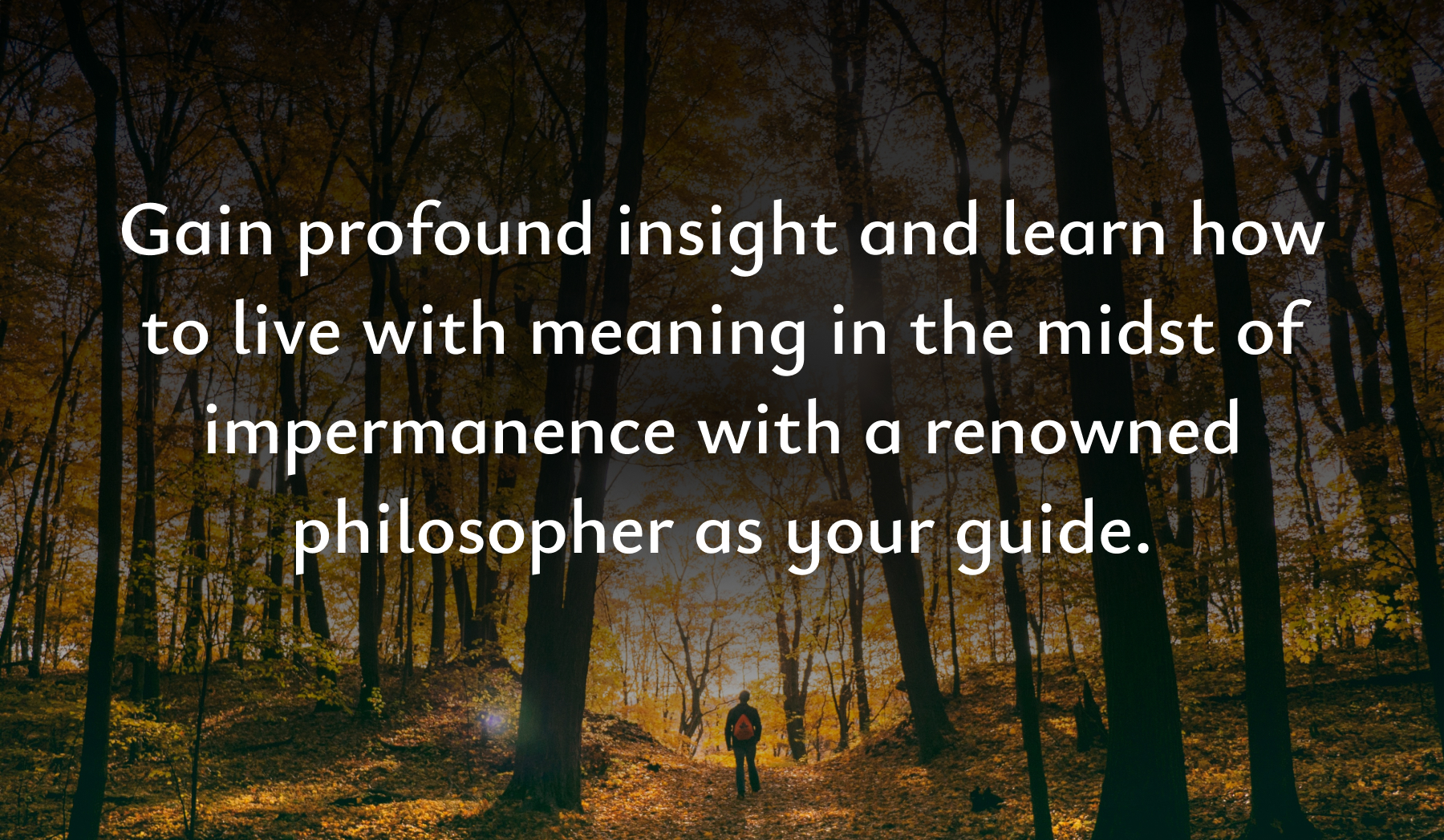
THE WISDOM ACADEMY PRESENTS
Buddhism As Philosophy: Nonself & Reality
An Online Course with Mark Siderits
Dive into the heart of Buddhist philosophy with Mark Siderits and explore profound teachings on nonself, suffering, and perception.
What is the self? How do we understand suffering? What is the nature of reality? Buddhism As Philosophy: Nonself and Reality invites you to tackle these profound questions with Mark Siderits, a philosopher known for his groundbreaking work in Buddhist thought.
The course is based on Mark’s book Buddhism As Philosophy, the most popular book for undergraduate courses on Buddhist philosophy.
In this course, you will
• gain a vivid new understanding of the sense of self as the origin of suffering,
• receive incisive guidance for examining and exploring your subjective sense of self,
• explore how the twelvefold chain of dependent origination explains the cycle of samsara and the perpetuation of suffering,
• and much more!
Sign up now and learn at your own pace. Scroll down to see a full schedule.
Tuition: $247
Includes lifetime access for enrolled students!
This course is not included in the Spring Sale. After enrolling, check your email for a welcome email with instructions on how to take the course. When you enroll in any Wisdom Academy course, you agree to our terms of use. Enrolled students have lifetime access to course materials. Wisdom is a 501(c)(3) nonprofit. Your tuition supports the creation of more courses like this one. Thank you! For more about our terms, please see the Wisdom Academy FAQ.
How can my life have meaning when I know that it will end?
This vital question underlies the rich, engaging journey you’ll take in this new online course. As we grapple with the reality of suffering, we look for a sense of meaning to give us happiness. But faced with the reality of death, it can feel like meaning keeps slipping through our fingers.
How, then, can we live with a sense of meaning?
In this course, you’ll explore this question with one of the finest minds in Buddhist thought: renowned philosopher, teacher, author, and translator Mark Siderits. The course gives you access to clear, structured, and profoundly useful ways of understanding nonself, reality, suffering, and meaning. You’ll understand the role of philosophy in your path, and you’ll learn how to do philosophy from an eminently qualified instructor.
If you’re interested in Buddhist philosophy, and you want to explore what it means to live with happiness and meaning in the midst of nonself and impermanence, this course is for you.
Tuition: $247
Includes lifetime access for enrolled students!
After enrolling, check your email for a welcome email with instructions on how to take the course. When you enroll in any Wisdom Academy course, you agree to our terms of use. Enrolled students have lifetime access to course materials. Wisdom is a 501(c)(3) nonprofit. Your tuition supports the creation of more courses like this one. Thank you! For more about our terms, please see the Wisdom Academy FAQ.
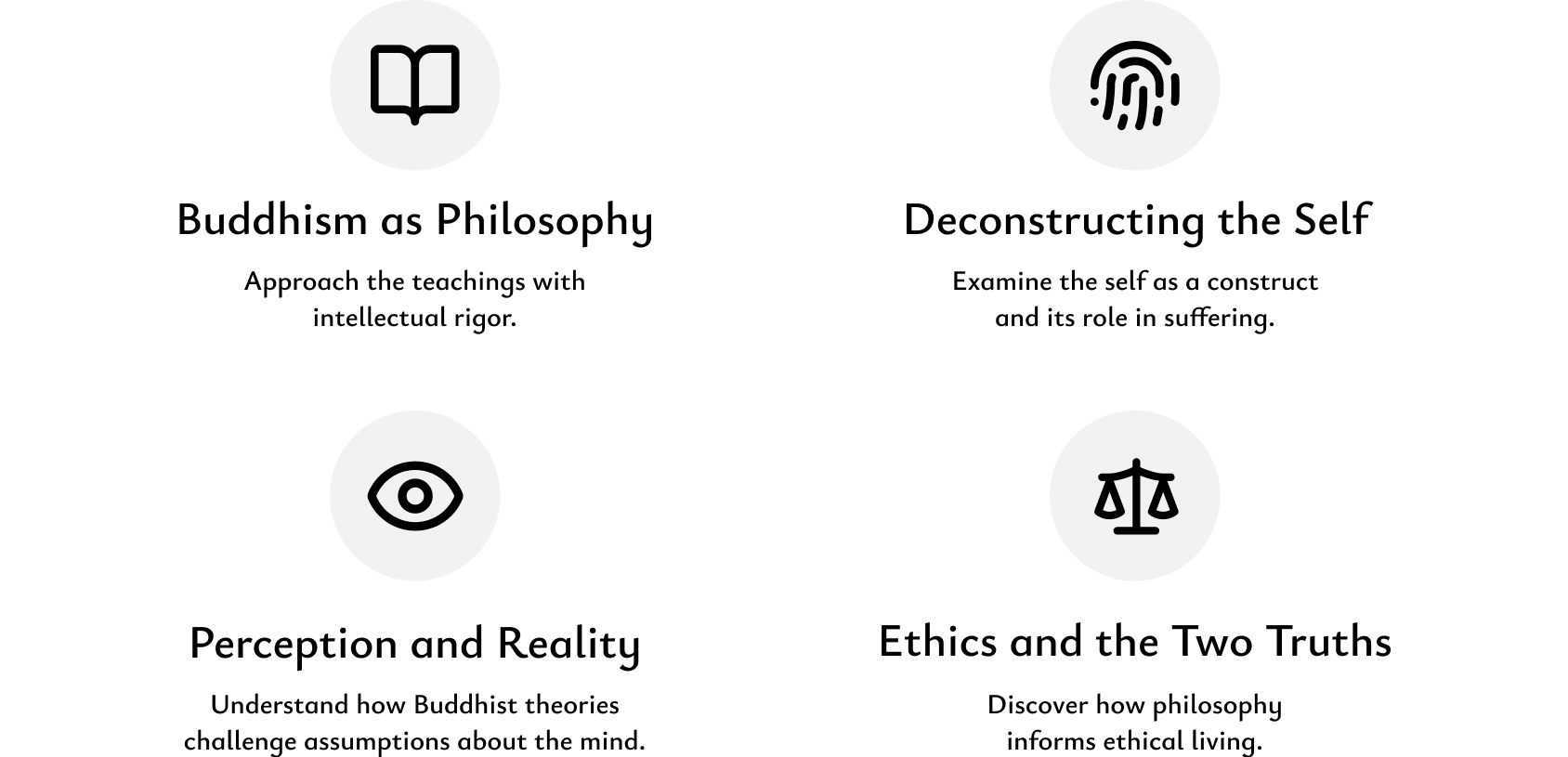

Your Course Includes
HD videos
Curated readings
A forum for discussion and support
Lifetime access
• Understand key ideas from Buddhist philosophy
• Gain a rich and nuanced understanding of Buddhist teachings on nonself, including exactly how the sense of self is created
• Learn how to understand and use philosophy in your practice from one of the greatest living philosophers of Buddhism
• And much more.
Enroll today to begin your journey toward understanding the nature of self, seeing reality clearly, and finding out how to live with a sense of meaning, even in the face of impermanence and death.
Tuition: $247
Includes lifetime access for enrolled students!
After enrolling, check your email for a welcome email with instructions on how to take the course. When you enroll in any Wisdom Academy course, you agree to our terms of use. Enrolled students have lifetime access to course materials. Wisdom is a 501(c)(3) nonprofit. Your tuition supports the creation of more courses like this one. Thank you! For more about our terms, please see the Wisdom Academy FAQ.

Lesson 1: Buddhism As Philosophy?
We begin our journey with Mark’s insights into how using the tools of philosophy will help you develop greater understanding of Buddhist teachings. He begins by framing Buddhism as a religion or soteriological (relating to salvation) system—but one in which philosophical investigation has an important role to play. You’ll be asked to interrogate exactly what it is you believe and why you believe it. In the process, you’ll learn to be open to debate, better understand objections others may raise to your worldview, and more carefully probe the reasonings underlying that worldview. The lesson also introduces the basic Buddhist project—to overcome existential suffering—as understood through the lens of the Buddha’s life-story.

Lesson 2: The Buddha’s Basic Teachings
Mark explores the core teachings of the Buddha that set the stage for all subsequent development: the four noble truths, the twelvefold chain of dependent origination and the eightfold path to liberation. What reason is there to believe that any of these doctrines are correct, or that they might help us overcome suffering? Central to the Buddha’s teachings is the claim that there is no self, and that it is ignorance of this fact that lies at the root of suffering. But how do we come to think there is such a thing as a self, and what role might that play in a happiness-seeking project if that turns out to be a kind of Ponzi scheme?

Lesson 3: Arguments for Nonself
Buddhists understand the “I”-sense, the feeling that there is a real “me” somewhere inside, to be the source of the ignorance that initiates a twelvefold chain of causes and effects ending in suffering. In this lesson, Mark explores the idea that this “I”-sense might stem from the existence of a self, understood as the one core part of each of us that is the real thinker and doer, the subject of awareness and the agent of action. You will see how Buddhists use philosophical reasoning to demonstrate that there can be no such thing. And you’ll be invited to examine their reasoning and decide for yourself whether it’s any good.

Lesson 4: The Unreality of Persons
Refuting a self might not be enough to undermine the “I”-sense. In this lesson, Mark explores another way we might believe in the existence of a real “I”: the idea that it is the person as a whole, something consisting of all the psychophysical elements (skandhas or aggregates). You will explore the analysis of another composite object, a chariot, to see how Buddhists argue that the person could not, strictly speaking, be real. After careful examination of the reasoning they use, you will see how this might answer one common question raised about Buddhist teachings: if Buddhists believe there is no self, how can they also hold that there is rebirth?

Lesson 5: The Two Truths
Mark explores the concept of diachronic personal identity (DPI) in the context of the Buddhist theory of nonself. We each believe (or hope) that we will continue to exist for some time to come: that there will be a future person who is me. If there is neither a self nor a person, must this not be false? He’ll lead you through a series of thought-experiments devised by the Buddhist monk Nāgasena to explore how belief in DPI might work even if there really are no persons. And you’ll learn about Buddhism’s distinction between two kinds of truth as a response to this question, and how the person functions as a sort of “useful fiction.”

Lesson 6: Buddhist Ethics
Mark shifts his focus to a philosophical examination of ethics in the Buddhist tradition. He’ll explain how to distinguish clearly between the karmic and Dharmic dimensions of Buddhist moral teachings—ethics for layfolk and ethics for those on the Path. You’ll gain insight into Buddhist answers to questions about what the good life is, what the moral laws are, and what reasons there are to practice precepts like universal benevolence. You will see how the Buddhist teaching of nonself might serve to answer the perennial question, “Why should I be moral?”

Lesson 7: Abhidharma as the Metaphysics of Empty Persons
In the first of four lessons on Abhidharma, Mark explains how the Abhidharma tradition—distinct from early Buddhism and Mahāyāna—aims to systematize and elaborate upon the Buddha’s teachings to devise a “metaphysics of empty persons.” If composites such as chariots, forests and persons are not strictly speaking real, then what is? Only dharmas, we are told, but what are they? You’ll discover how to analyze whether something is a dharma—namely by determining if it has svabhāva (i.e., bears its nature intrinsically). And you’ll begin to see how this seemingly very dry topic of Abhidharma metaphysical analysis might turn out to be important to our welfare.

Lesson 8: Dharmas in Time
In this lesson Mark explores the metaphysics of time. The Buddha taught that everything is impermanent, but Abhidharma schools give that teaching a radical twist: everything is momentary, going out of existence an instant after it comes into existence. You’ll explore the argument they use to support this surprising conclusion. And you’ll examine the ways they try to square the conclusion with our everyday experience. All this will affect how we understand causation, something that is central to the Buddhist analysis of our existence. Just what might it mean to say that when something occurs, it brings about the existence of something else?

Lesson 9: Abhidharma Theories of Perception
What we are actually aware of when we perceive something: is it the physical object outside the mind, or is it a mental representation? One Abhidharma school argues that it must be the latter. This question will turn out to have major consequences for our understanding of what the world is like. For this view about perception will lead straight to the question of whether the external physical world might all be an illusion. Some Mahāyāna Buddhists make the surprising claim that it is, so it is important to carefully examine the Abhidharma arguments about the object of perception.

Lesson 10: Empty Persons in Abhidharma
If nothing about me persists from one moment to the next, how can I remember my past and anticipate my future? In the final lesson of this course, you’ll gain greater clarity about how Abhidharma theories might help us rid ourselves of a concrete “I”-sense that is reinforced by personal memory, future rumination, and even present-moment introspection. He will also discuss a question many people have about the Buddhist claim that everything about us is causally determined: does that not rule out the possibility of free will?
Inspired by Siderits’ renowned book Buddhism As Philosophy, this course is designed for those with a curiosity about the philosophical dimensions of Buddhism—ideal for
• students studying Buddhist philosophy, comparative religion, or related fields;
• practitioners who want a better understanding of important Buddhist philosophy;
• or anyone ready to deepen their intellectual engagement with these timeless ideas.
Tuition: $247
Includes lifetime access for enrolled students!
After enrolling, check your email for a welcome email with instructions on how to take the course. When you enroll in any Wisdom Academy course, you agree to our terms of use. Enrolled students have lifetime access to course materials. Wisdom is a 501(c)(3) nonprofit. Your tuition supports the creation of more courses like this one. Thank you! For more about our terms, please see the Wisdom Academy FAQ.
• January 17, 2025: Lesson 1 becomes available at 9 A.M. US Eastern Time.
• January 24: Lesson 2
• January 31: Lesson 3
• February 7: Lesson 4
• February 14: Lesson 5
• February 21: Lesson 6
• February 28: Lesson 7
• March 7: Lesson 8
• March 14: Lesson 9
• March 21: Lesson 10
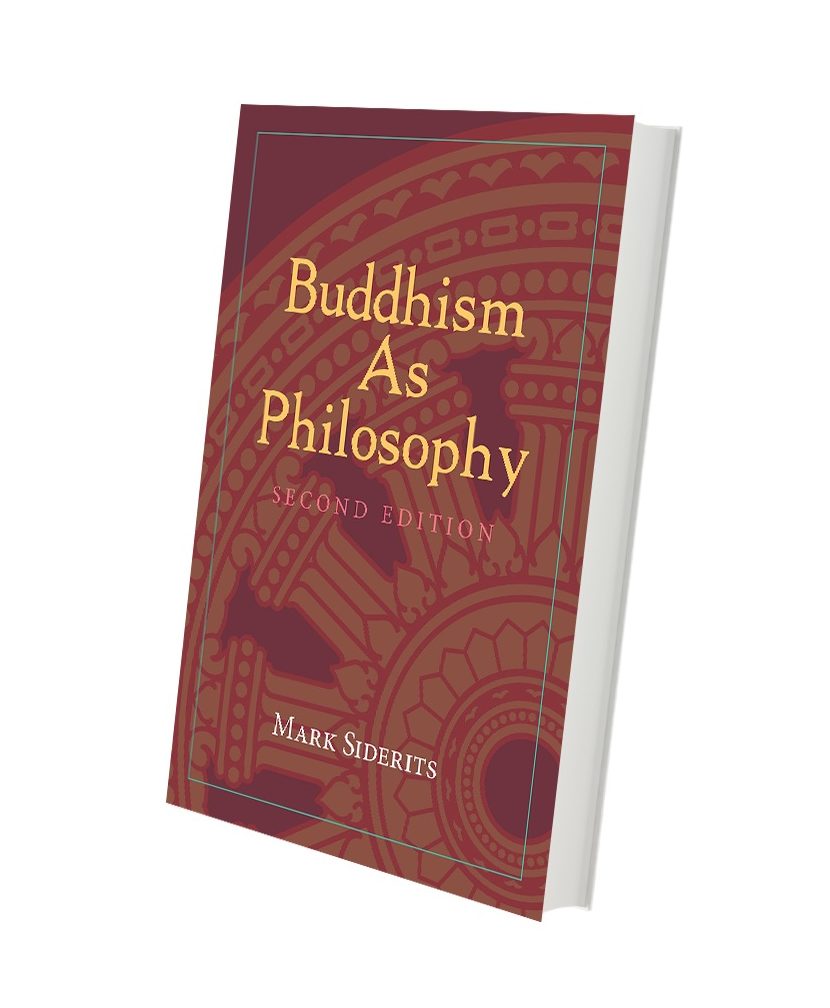 Buddhism As Philosophy
Buddhism As Philosophy
“Since the publication of the first edition of Buddhism As Philosophy, the need for such a book has only grown…more undergraduate programs are teaching Buddhist philosophy and looking for accessible materials that still do justice to the tradition’s intellectual complexity…The book teaches students how to do philosophy at the same time as it teaches them the particularities of Buddhist philosophy. Siderits moves fluidly from translations of primary texts to their explication and evaluation, both modeling expert philosophical methodology and pausing to explain to students how philosophical argumentation works.”
—Malcolm Keating, Yale-NUS College
Learn more and get the book here.
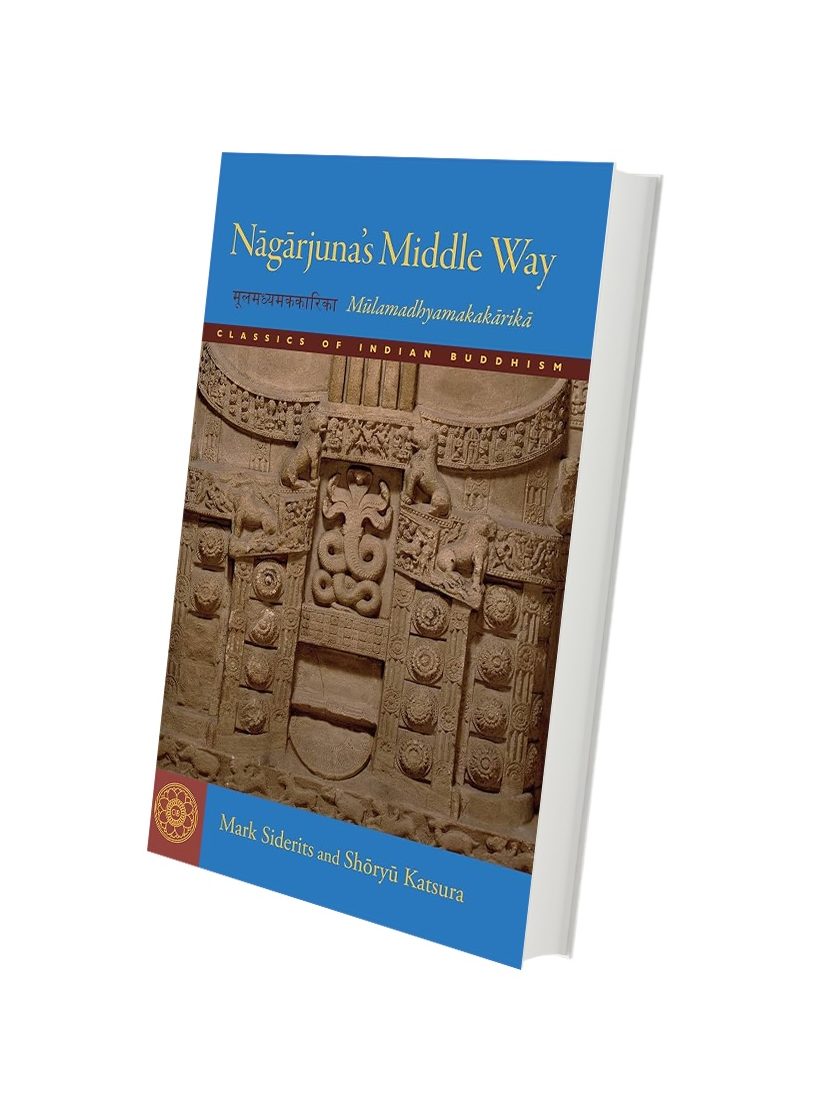 Mark Siderits is also co-translator of
Mark Siderits is also co-translator of
Nāgārjuna’s Middle Way
Nagarjuna’s renowned twenty-seven-chapter Fundamental Verses on the Middle Way (Mulamadhyamakakarika) is the foundational text of the Madhyamaka school of Mahayana Buddhist philosophy. It is the definitive, touchstone presentation of the doctrine of emptiness.
Tuition: $247
Includes lifetime access for enrolled students!
After enrolling, check your email for a welcome email with instructions on how to take the course. When you enroll in any Wisdom Academy course, you agree to our terms of use. Enrolled students have lifetime access to course materials. Wisdom is a 501(c)(3) nonprofit. Your tuition supports the creation of more courses like this one. Thank you! For more about our terms, please see the Wisdom Academy FAQ.
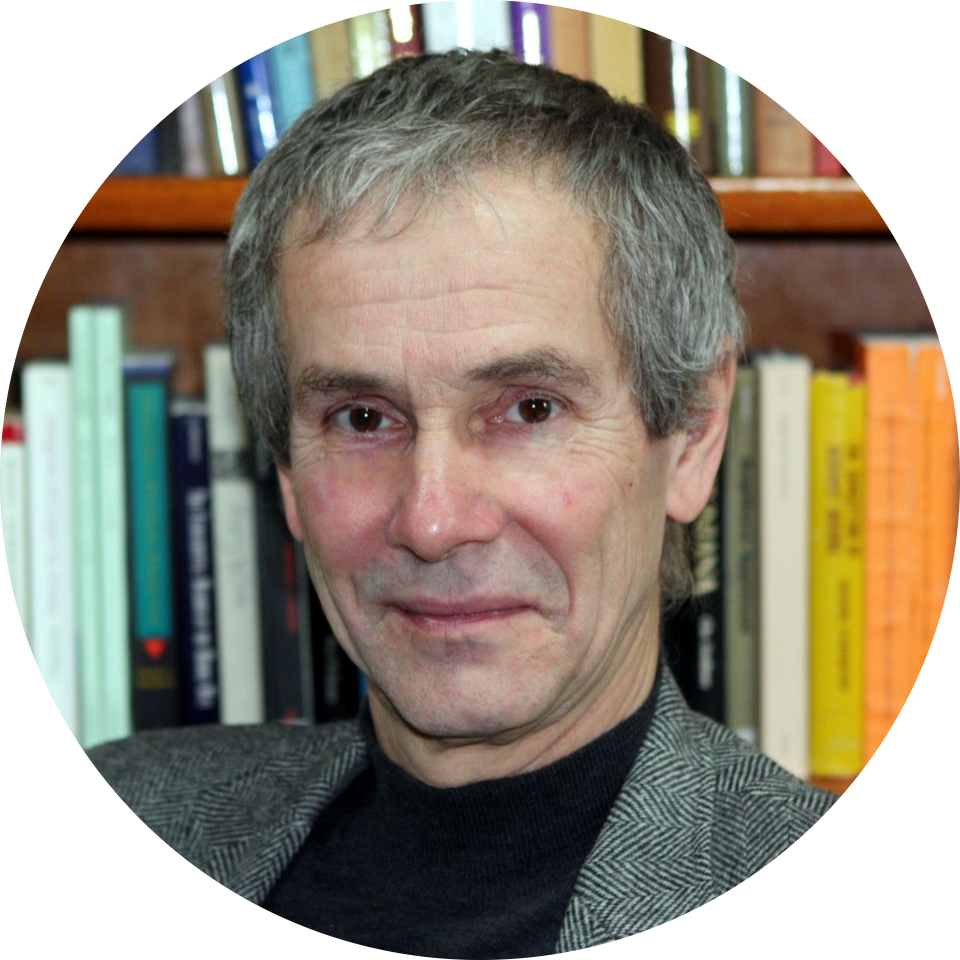
Mark Siderits was trained in Asian and Western philosophy at the University of Hawaii and Yale University. He has taught both Asian and Western philosophy, for many years at Illinois State University, and most recently as Professor of philosophy at Seoul National University, from which he retired in 2012. He is the author or editor of five books and has published numerous articles on a wide variety of subjects in Indian Buddhist philosophy and comparative philosophy. Much of his work aims at building bridges between the classical Indian tradition and contemporary philosophy, by using insights from one tradition to cast light on problems arising in the other. He is the co-translator of Nāgārjuna’s Middle Way.
The Wisdom Academy is the leading provider of high-quality online courses about Buddhism and meditation.
The Wisdom Academy was founded in 2016. Since then, we’ve grown to be the leader in online Buddhist learning, with over 50 courses and thousands of students enrolled.
In the Academy, dedicated students come together with beloved teachers to learn authentic philosophy and practices for awakening.
Our courses offer teachings on Dzogchen, shamatha, mahamudra, vipassana, mindfulness, jhana, and much more. The clear, progressive structure of the courses will support you in learning about the profound philosophy and practices of the Dharma. You’ll discover the vivid and immediate ways that the teachings can create more ease, joy, and freedom in your daily life. Click here to learn more and explore our course catalog.
![]()


